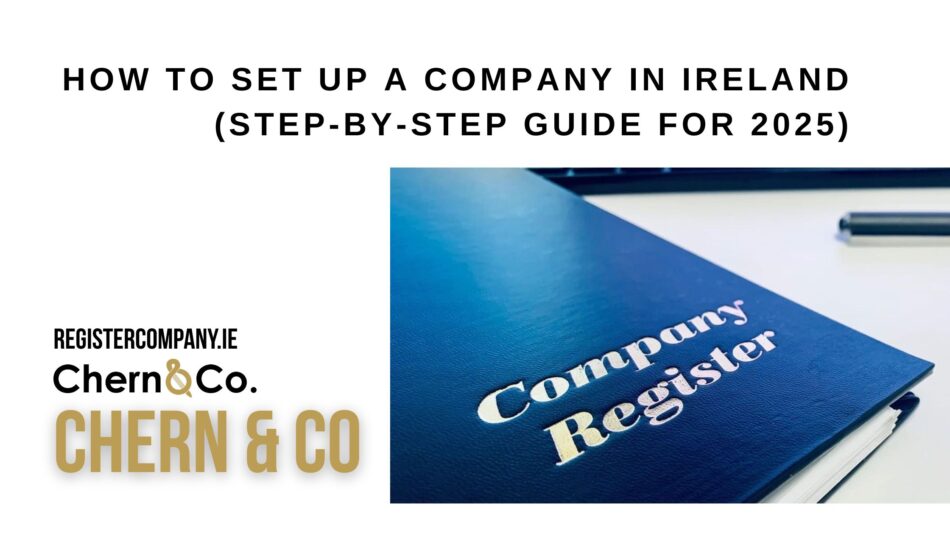Ireland is one of the most attractive countries in Europe to start a business—thanks to its low corporate tax rate, English-speaking workforce, and pro-business environment. Whether you’re a local entrepreneur or a foreign investor, this guide will walk you through how to set up a company in Ireland step by step in 2025.
Why Set Up a Company in Ireland?
Before we get into the process, it’s important to understand why so many startups and global corporations choose Ireland:
-
Corporate tax rate of 12.5%
-
Access to the EU single market
-
Highly educated, English-speaking talent pool
-
Robust legal and financial systems
-
Tech-friendly environment with global giants like Google, Facebook, and Apple operating in Ireland
If you’re ready to set up a company in Ireland, here’s what you need to know.
Step 1: Choose the Right Business Structure
The most common form of business in Ireland is the Private Company Limited by Shares (LTD). However, other structures include:
-
Sole Trader
-
Partnership
-
Designated Activity Company (DAC)
-
Company Limited by Guarantee (CLG)
-
Public Limited Company (PLC)
For most entrepreneurs, the LTD structure is the best fit, offering limited liability, flexibility, and tax efficiency.
Step 2: Choose a Unique Company Name
To set up a company in Ireland, you must pick a name that is:
-
Unique (not too similar to existing company names)
-
Not offensive or misleading
-
Not infringing on trademarks
You can check name availability through the Companies Registration Office (CRO) website.
💡 Tip: Use a name that reflects your brand and is easy to remember.
Step 3: Appoint Directors and a Company Secretary
An Irish company must have at least one director and one company secretary. Here are the requirements:
-
At least one director must be an EEA (European Economic Area) resident. If not, you’ll need a bond or set up a branch office.
-
A company secretary ensures legal compliance. In single-director companies, a separate secretary must be appointed.
-
You must be over 18 and not disqualified from holding office.
Step 4: Decide on a Registered Office Address
You need a physical address in Ireland (not a P.O. Box) to receive official correspondence. This is your company’s registered office.
If you’re not based in Ireland, many company formation agents offer virtual office services to help with this.
Step 5: Prepare the Required Documents
To officially set up a company in Ireland, the following documents are required:
-
Constitution of the company (formerly known as Memorandum & Articles of Association)
-
Form A1, which includes:
-
Company name
-
Director(s) and secretary details
-
Registered office address
-
Shareholder details and issued share capital
-
Statement of compliance
-
You can file these documents online via the CRO’s CORE platform or through a formation agent.
Step 6: Register with the Companies Registration Office (CRO)
Once your documents are ready, submit them to the CRO. You can do this:
-
Online via core.cro.ie
-
Through a professional service provider
Processing time: 3 to 5 working days (longer during peak periods)
Once approved, you’ll receive a Certificate of Incorporation, and your company will be officially registered in Ireland.
Step 7: Register for Taxes
After your company is incorporated, you need to register with the Revenue Commissioners for tax purposes. Depending on your business activity, this may include:
-
Corporation Tax
-
VAT (if turnover exceeds €37,500 for services or €75,000 for goods)
-
PAYE/PRSI (if hiring employees)
This can be done online through the Revenue Online Service (ROS).
Step 8: Set Up a Business Bank Account
You’ll need a corporate bank account in Ireland to manage company funds. Most banks will require:
-
Certificate of Incorporation
-
Company constitution
-
Personal ID and proof of address of directors and shareholders
-
CRO printout
Popular banks include Bank of Ireland, AIB, and Revolut Business. Alternatively, digital banking options like Wise or Fire are gaining popularity among startups.
Step 9: Comply with Ongoing Requirements
To maintain your company’s good standing, you must meet ongoing obligations:
-
File an Annual Return with financial statements
-
Keep proper accounting records
-
File taxes and meet Revenue deadlines
-
Hold annual general meetings (AGMs), if applicable
Failing to comply can result in fines or being struck off the company register.
Can a Non-Resident Set Up a Company in Ireland?
Yes. You do not need to be an Irish citizen or resident to set up a company in Ireland, but you must:
-
Appoint at least one EEA-resident director OR
-
Purchase a Section 137 Non-EEA Resident Bond (~€2,000)
Additionally, using a formation agent can help non-residents navigate local requirements efficiently.
How Much Does It Cost to Set Up a Company in Ireland?
Here’s a rough breakdown:
| Item | Estimated Cost (EUR) |
|---|---|
| €249 | |
| Registered Office (annually) | €150 – €300 |
| Non-EEA Director Bond (if needed) | €2,000+ |
| Accountant/Agent Setup Fees | €300 – €800 |
| Tax Registration & Bank Setup | Usually included in agent packages |
Final Thoughts
To set up a company in Ireland in 2025, you’ll need to make strategic choices about your company structure, fulfill legal requirements, and stay compliant with local tax laws. Thankfully, the process is efficient, especially with the support of professional agents.
Whether you’re launching a tech startup or expanding into Europe, Ireland is a powerful hub with global reach and strong support for entrepreneurs. Chern & Co helps local and international customers to incorporate and register their businesses in Ireland and the UK for over 15 years. We believe in long-term relationships and support our clients as their businesses grow, maintaining full compliance with statutory requirements.









